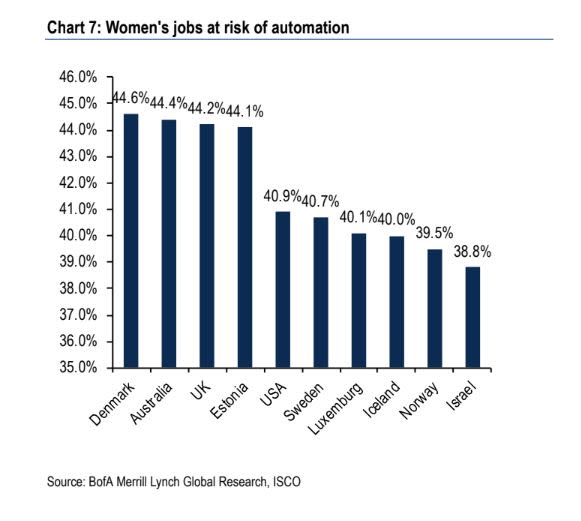Robots will take men's jobs before women's, BAML says
A new report by Bank of America says that as automation takes jobs — it’ll take jobs from men first.
In a report called “The Sheconomy,” published Wednesday, analysts said that as the threat of job automation draws even closer, “women could be better placed than men to withstand the threat from job automation by robots in the future.”
The report highlighted that in 80% of the 33 OECD (Organisation for Economic Co-operation and Development) member countries surveyed in particular — such as Australia, the UK and the U.S. — “men are more at risk of losing their job to a robot than women.”
The bank’s analysts also found that the country where women have the lowest risk of being replaced by a robot was Israel – which they say is because “30.4% of Israeli women are employed in scientific and intellectual fields that have low probability of automation.”
Women in Denmark faced the highest.

Robots for hire
In the U.S., a quarter of the labor force faces “high exposure to automation in the coming decades,” a Brookings report found in January.
Jobs on the chopping board were those in office administration, production, transportation, and food preparation, the report said, with “over 70 percent of their tasks potentially automatable, even though they represent only one-quarter of all jobs.”
American workers are becoming aware of their replaceability, with a LinkedIn report suggesting that those without college degrees are shifting from desk jobs, at high risk of automation, to more hands-on jobs such as plumbing or driving for Lyft or Uber.
Aarthi is a writer for Yahoo Finance. Follow her on Twitter @aarthiswami.
Read more:
Workers threatened by automation shift their skills to become drivers, electricians: LinkedIn
From Google to Netflix, global companies most at risk of AI takeover
Follow Yahoo Finance on Twitter, Facebook, Instagram, Flipboard, LinkedIn, YouTube, and reddit.

 Yahoo Finance
Yahoo Finance 
